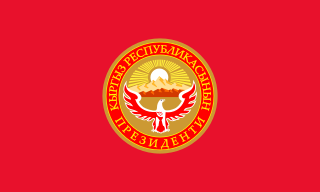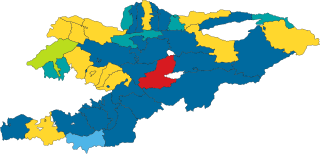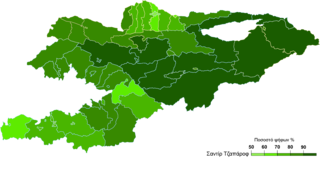
The history of the Kyrgyz people and the land now called Kyrgyzstan goes back more than 3,000 years. Although geographically isolated by its mountainous location, it had an important role as part of the historical Silk Road trade route. Turkic nomads, who trace their ancestry to many Turkic states such as the First and Second Turkic Khaganates, have inhabited the country throughout its history. In the 13th century, Kyrgyzstan was conquered by the Mongols; subsequently it regained independence but was invaded by Kalmyks, Manchus, and Uzbeks. In 1876, it became part of the Russian Empire, remaining in the USSR as the Kirghiz Soviet Socialist Republic after the Russian Revolution. Following Mikhael Gorbachev's democratic reforms in the USSR, in 1990 pro-independence candidate Askar Akayev was elected president of the SSR. On 31 August 1991, Kyrgyzstan declared independence from Moscow, and a democratic government was subsequently established.

The politics of Kyrgyzstan, officially known as the Kyrgyz Republic, takes place in the framework of a presidential system representative democratic republic, whereby the President is head of state and the Chairman of the Cabinet of Ministers is head of government. Executive power is exercised by the government. Legislative power is vested in both the government and parliament. The Economist Intelligence Unit rated Kyrgyzstan an "authoritarian regime" in 2022.

Elections in Benin take place within the framework of a multi-party democracy and a presidential system. Both the President and the National Assembly are directly elected by voters, with elections organised by the Autonomous National Electoral Commission (CENA).

Kyrgyzstan elects on the national level a head of state – the president – and a legislature. The president is elected for a tenure of single six-year term by the people. The Supreme Council is composed of 120 members filled by proportional representation.
The Tulip Revolution or First Kyrgyz Revolution led to President of Kyrgyzstan Askar Akayev's fall from power. The revolution began after parliamentary elections on February 27 and March 13, 2005. The revolutionaries alleged corruption and authoritarianism by Akayev, his family and supporters. Akayev fled to Kazakhstan and then to Russia. On April 4, 2005, at the Kyrgyz embassy in Moscow, Akayev signed his resignation statement in the presence of a Kyrgyz parliamentary delegation. The resignation was ratified by the Kyrgyz interim parliament on April 11, 2005.

The president of Kyrgyzstan, officially the president of the Kyrgyz Republic, is the head of state and head of government of the Kyrgyz Republic. The president directs the executive branch of the national government, is the commander-in-chief of the Kyrgyz military and also heads the National Security Council.

Presidential elections were held in Kyrgyzstan on 10 July 2005. The result was a landslide victory for acting President Kurmanbek Bakiyev, marking the end of his interim government formed after the previous president, Askar Akayev, was overthrown in the revolution in March 2005.

The Supreme Council is the unicameral parliament of the Kyrgyz Republic. It was known as the Supreme Soviet of the Kirghiz Soviet Socialist Republic until 1991.

A constitutional referendum was held in Kyrgyzstan on 21 October 2007, following the constitutional crisis caused by amendments passed since the Tulip Revolution in 2005 being invalidated by the Constitutional Court of Kyrgyzstan on 14 September 2007. Voters were asked whether questions on a new constitution and electoral law. Both were approved by over 95% of voters.
Early parliamentary elections were held in Kyrgyzstan on 16 December 2007. The election was called by President Kurmanbek Bakiyev after the constitutional referendum on 21 October 2007 approved a new electoral system and constitutional reform proposals, enlarging the parliament to 90 MPs and introducing party-list voting.

Early presidential elections were held in Kyrgyzstan on 30 October 2011 to replace Interim President Roza Otunbayeva. Former Prime Minister Almazbek Atambayev of the Social Democratic Party of Kyrgyzstan won in the first round.

Early parliamentary elections were held in Kyrgyzstan on 10 October 2010. All 120 seats of the Supreme Council were elected by the party list system. Seats were allocated to all parties who obtained more than 5% of the vote overall and more than 0.5% in each of the nine provinces, capped at 65 seats per party.

The Constitution of Kyrgyzstan was the supreme law of the Kyrgyz Republic. The constitution in force from 2010 until 2021 was passed by referendum on June 27, 2010, replacing the previous constitution. It introduced a strong parliament to the country, reducing the power of the historically strong president. The constitution is similar in many ways to the previous one.

Parliamentary elections were held in Belarus on 23 September 2012. At stake were the 110 seats in the House of Representatives, the lower house of the National Assembly of Belarus.

Parliamentary elections were held in Kyrgyzstan on 4 October 2015.

Parliamentary elections were held in Belarus on 11 September 2016.

Parliamentary elections were held in Georgia on 31 October and 21 November 2020 to elect the 150 members of Parliament. The ruling Georgian Dream party led by Prime Minister Giorgi Gakharia won re-election for a third term in office, making it the first party in Georgian history to do so. The elections also saw a record number of opposition parties elected to parliament.

Parliamentary elections were held in Kyrgyzstan on 4 October 2020. The results showed that pro-government parties had won a supermajority of seats. The election was subsequently annulled by the Central Election Commission during the 2020 Kyrgyzstan protests.

Snap parliamentary elections were held in Kyrgyzstan on 28 November 2021. They followed the annulment of the results of the October 2020 elections and the subsequent protests against the election's conduct. Six parties passed the 5% threshold needed to win seats in the parliament. Turnout hit a record low at less than 35%.

Snap presidential elections were held in Kyrgyzstan on 10 January 2021, alongside a constitutional referendum. The elections were called early following the resignation of President Sooronbay Jeenbekov in the wake of the 2020 Kyrgyzstani protests.













